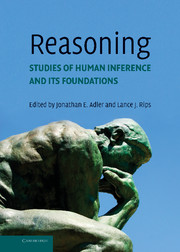41 - Beyond Intuition and Instinct Blindness: Toward an Evolutionarily Rigorous Cognitive Science
Published online by Cambridge University Press: 05 June 2012
Summary
Nothing in biology makes sense except in the light of evolution.
Theodosius DobzhanskyIs it not reasonable to anticipate that our understanding of the human mind would be aided greatly by knowing the purpose for which it was designed?
George C. WilliamsThe cognitive sciences have reached a pivotal point in their development. We now have the opportunity to take our place in the far larger and more exacting scientific landscape that includes the rest of the modern biological sciences. Every day, research of immediate and direct relevance to our own is being generated in evolutionary biology, behavioral ecology, developmental biology, genetics, paleontology, population biology, and neuroscience. In turn, many of these fields are finding it necessary to use concepts and research from the cognitive sciences.
But to benefit from knowledge generated in these collateral fields, we will have to learn how to use biological facts and principles in theory formation and experimental design. This means shedding certain concepts and prejudices inherited from parochial parent traditions: the obsessive search for a cognitive architecture that is general purpose and initially content-free; the excessive reliance on results derived from artificial “intellectual” tasks; the idea that the field's scope is limited to the study of “higher” mental processes; and a long list of false dichotomies reflecting premodern biological thought – evolved/learned, evolved/developed, innate/learned, genetic/environmental, biological/social, biological/cultural, emotion/cognition, animal/human. Most importantly, cognitive scientists will have to abandon the functional agnosticism that is endemic to the field (Tooby & Cosmides, 1992).
Information
- Type
- Chapter
- Information
- ReasoningStudies of Human Inference and its Foundations, pp. 843 - 865Publisher: Cambridge University PressPrint publication year: 2008
References
Accessibility standard: Unknown
Why this information is here
This section outlines the accessibility features of this content - including support for screen readers, full keyboard navigation and high-contrast display options. This may not be relevant for you.Accessibility Information
- 2
- Cited by
